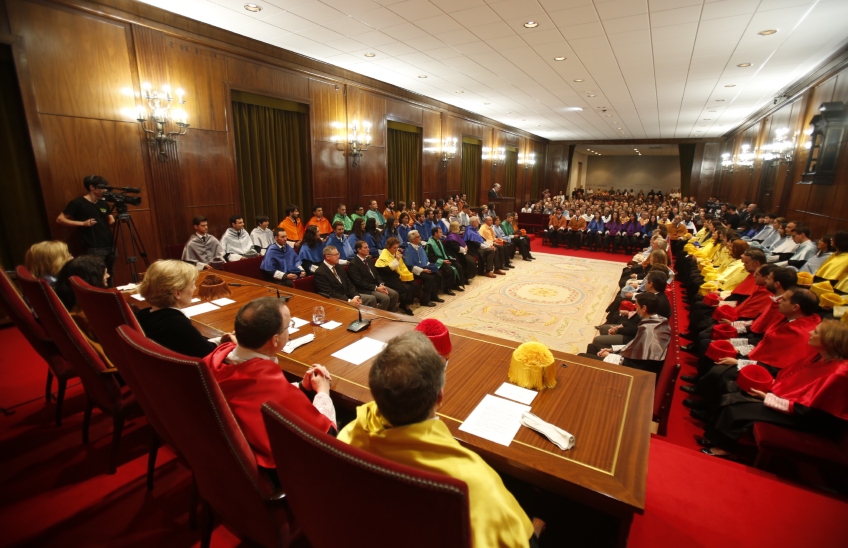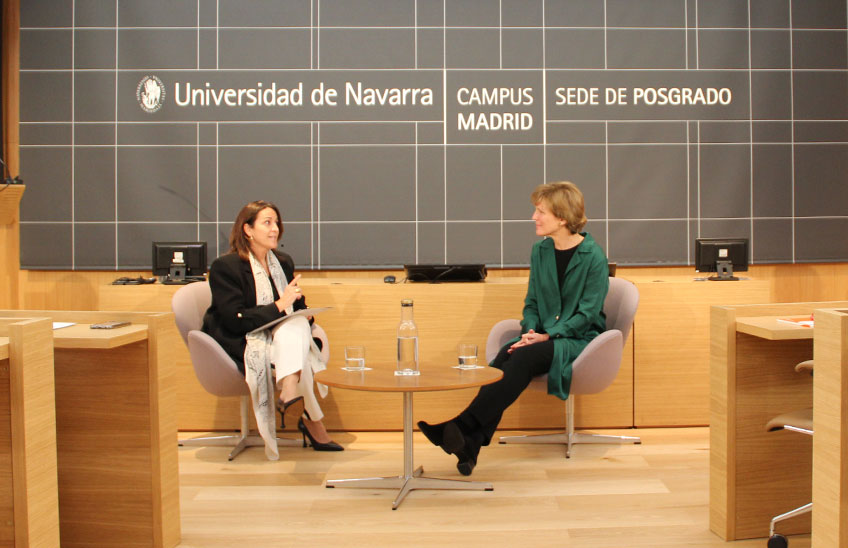Modesto Santos, example of a successful life: vigorous intellectual, faithful priest and endearing figure
The University of Navarra remembers the professor of the School of Philosophy and Letters and the Ecclesiastical School of Philosophy on the first anniversary of his death.

FotoManuelCastells/From left to right, Ana Marta González, Julia Pavón, Secundino Fernández, Santiago Collado and César Izquierdo.
25 | 06 | 2025
On June 6, the University held an In Memoriam Ceremony in memory of Modesto Santos, professor at the School of Philosophy and Letters of the School of Philosophy and Letters and of the EcclesiasticalSchool of Philosophyon the occasion of the first anniversary of his death.
The ceremony was opened by the Vice President of the Office of Academic Affairs, Secundino Fernández, who recalled his humility and sense of duty: "He was one of those people whose coherence of life spoke even when he was silent". And he emphasized that at the University he left an enormous mark on how to "teach with clarity and live with simplicity".
Some of the people who knew his ideas, his style and his bequest best, such as César Izquierdo, Professor Emeritus of the School of Theology; Julia Pavón, dean of the School of Philosophy and Letters, José Ángel Lombo, professor at the Pontifical University of the Holy Cross (Rome) and Ana Marta González, professor at the School of Philosophy and Letters, took part in the tribute.
As Professor Fernández pointed out, "for Modesto Santos reason was not a threat to faith, but its noblest ally, its natural channel". In this sense, César Izquierdo gave a talk entitled "Modesto Santos: priest and defender of reason".
Professor Izquierdo, a good friend of Professor Santos, recalled some of the highlights of his biography and emphasized the moments lived with him, even recalling some of the anecdotes of his last hospitalizations.
He explained that he was a faithful defender of reason and highlighted the involvement of Modestos Santos in the defense of life. As when he was appointed consultant the Spanish Episcopal lecture body that dealt with these issues and his active participation in the preparation of doctrinal documents that were quite influential at the time, such as '100 questions and answers on abortion' and '100 questions and answers on euthanasia'.
He pointed out that Professor Santos kept alive his enthusiasm for philosophical work , but little by little he was increasingly taken over by pastoral zeal and dedicated many hours to the priestly ministry, especially in the parish of St. Vicenta Maria, where he was a neighbor. He concluded by recalling that when he died in May 2024, a multitude of memories that he had of him came to report : "Then I discovered that beneath his whole life as a teacher and priest, and behind a personality that was evident in his words and behavior, there was a great simplicity of heart. A vigorous intellectual, a faithful priest, Modesto Santos remains as a friendly figure, well-humored and profound, as a successful life".
Next, José Ángel Lombo, a disciple of Professor Santos, spoke on "In search of the unity of human action", highlighting his interest in Law and his involvement in Bioethics. He also recalled two characteristics of his academic work: "clarity of exposition and availability for dialogue".
He was followed by Ana Marta González, director of the department of Philosophy, with an intervention entitled "Virtue and freedom". She pointed out that Professor Santos was a thinker and priest who united intellectual rigor, ethical depth and human closeness in an exemplary way. Defender of reason as the guide of human action, he conceived ethics as wisdom internship, where virtue allows the good use of reason and the orientation of freedom towards the good. He rejected a morality of prohibitions and "adjectival ethics", proposing a unitary and positive vision of human action. A demanding and perfectionist teacher, he "published little, but with great depth". His priestly identity was harmoniously integrated with his philosophical vocation, marked by a great breadth of interests and a cordial, humorous and formative presence.
Finally, the program concluded with a speech by Professor Julia Pavón, Dean of the School of Philosophy and Letters, who closed the event with an emotional thank you to Modesto, highlighting his discreet and close teaching, as well as his deep identification with the culture and identity of the university. He recalled a staff anecdote from 27 years ago, which illustrates his humanity and warmth, and linked his figure to recent words of Pope Leo XIV on the importance of institutions beyond individuals. He thus underlined the silent but firm mark that Modesto left on the School over the years.




